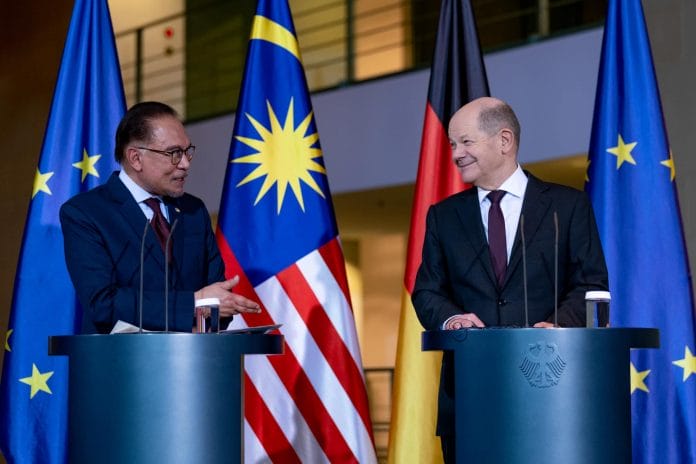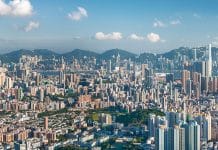By Collins Chong Yew Keat
Prime Minister Anwar Ibrahim’s visit to Germany has yielded the right returns in terms of economic, trade and investment spillover impact, but
Malaysia will need to have the greater support and buy-in from Germany in various domains, especially in the sectors of economy and investment, palm oil trade and security tie ups.
Malaysia will need to have high level investment sectors and a continuation of Germany’s strategic presence in critical sectors especially in semiconductor industries. India has now made its move in completely starting its semiconductor capacity in its entire spectrum, as it aspires to have its own sustainable returns and to rival China.
Talent exchange and strategic joint development in the small and medium enterprises domain also remain a core factor in developing the capacity needed to spur growth and investments in both countries, especially in Malaysia.
Malaysia will need to have a lasting and resilient presence of key German investments in the high level sectors which will continue to provide high income job opportunities and in creating ripple economic impact to the local economies.
Amplifying Mutual Trade Spillover Impact
Bilateral trade has grown by leaps and bounds, at an annual average of 5.2%. German companies invested EU€8.5bil (RM43.61bil) as of 2023.
Germany has been Malaysia’s largest trading partner among European Union member countries since 2000, while Malaysia is the largest trading partner for Germany among Asean member states.
In 2023, Malaysia’s total trade with Germany increased by 5.9 per cent to RM63.45 billion (US$13.90 billion) from RM59.87 billion (US$13.62 billion) in 2022.
Malaysia’s high quality workforce and skilled labour, apart from the good network of transportation and infrastructure in ensuring a critical supply chain assurance and as a future hub in the region provide vital supportive points for German investors.
More efforts in skill training and Technical and Vocational Education and Training (TVET) will be in place, as this will continue to provide an assured and sustaining pool of the right mixture of workforce and talent bank in powering the investment presence in the country.
Other focus areas include the digital transformation, new energy drive and a green economy, all of which both countries are consistently in the new drive to extend their capacity in the new industries, which Malaysia will rely on the Germans for their far superior head start and capabilities in these fields.
Germany is also eyeing the halal industry and the development of new sectors in Malaysia which will further deepen strategic ties that will be able to create ripple effects and cementing trust that will eventually provide returns in the high politics realms.
Boost in High Income Economic Transition
Germany can help in key technology transfer in aerospace, automotive, electronics and new scientific transition, and can offer support in bolstering Malaysia’s drive in expanding its own semiconductor sector
Being at the direct benefit of top Western firms’ exodus from China, Malaysia continues to be the attractive top investment hub in key industries including EV, digital and data management, green technology and new manufacturing hubs, and a new domain of electrics and electronics.
All these will need the support, experience and expertise of the Germans, where Berlin will be able to create a mutually viable symbiosis of ties that can create deeper trust and confidence and eventually a more healthy interdependence
As Berlin aims to expand its presence in the halal market, Malaysia emerges as the key support point, and both powers leverage on one another’s strength in different areas in consolidating a more comprehensive and mutually beneficial partnership
Both countries rely on SMEs being the primary driver of economic growth and new ventures are critical in ensuring both countries’ SMEs will have the necessary tools, support and market in upgrading and maintaining their appeal and technology and capital support
700 German companies are operating in Malaysia, including giants such as Siemens, Infineon, and Volkswagen, with 65,000 jobs created.
Malaysia will need Germany’s expertise and continuing presence for the sustainability of job security and also as the vital factor in driving the new economic and industrial transition of Malaysia, as outlined in the Industrial Master Plan transformation and the new energy transition
Berlin is looking at Malaysia as one of the key hubs in Southeast Asia, both in expanding its new economic and supply chain and assurances in key minerals and resources in the region and also as a critical support base for strategic security and defence overtures in the region
The chief operating officer of Infineon, Rutger Wijburg, said the company was on track to build the world’s largest 200-millimetre SiC (silicon carbide) power fab in Kulim.
Infineon and Malaysia will be building the world’s biggest SiC factory, also in addressing climate change
Infineon has been operating in Malaysia since 1973, and over the next five years, the company will additionally invest up to five billion euros in Kulim during a second construction phase for its Module Three plan.
The investment will lead to an annual SiC revenue potential of about seven billion euros by the end of the decade, together with the planned 200-millimetre SiC conversion in Villach and Kulim.
Renewed Indo Pacific Strategic Security Presence
Berlin’s Indo Pacific intent has been renewed extensively, with both China in mind and in leading the EU’s new strategic presence in complementing Washington’s existing base of support.
The German Air Force initiated the Rapid Pacific 2022, sending a fleet of aircraft to the far lands of Asia. Through this, it showed that it can send its fighter jets to Asia within 24 hours, with six Eurofighter jets, four A400M multirole aircraft and three A330 multi role tanker transport planes travelling from Neuburg Air Base to Singapore within 24 hours, back in August 2022. This was on top of the deployment of a frigate to East Asia in 2021.
It signalled the stance for multilateralism and the rules-based international order,and a symbol of solidarity with current allies. China remains the ultimate bigger picture, with a strong message being sent.
The new changes mark a stark change of direction for Germany where since the 1970s, Germany relied on Russia for energy.
This new wake up call of Russian energy overdependence is now jolting Berlin up from its slumber in the similar risks with Beijing. The distancing effort from Beijing is now being pursued by other European countries in a more speedy and profound manner.
European powers have rediscovered the value of the Transatlantic alliance with the U.S, and have found new hope that Washington will also back the Europeans in their dealings with China.
China’s strategy to counter this trend seems to be to propose bilateral talks with individual European countries. Splitting the democratic camp has always been a big part ofthe authoritarian playbook. Europe, so far, has been swaying and avoiding the punches.
Regional Geopolitical Targeting
The security arena continues to be the more critical aspect, as Manila and Bangkok are also part of the plan.
All three countries are seen as strategic and vital for Berlin’s overall Indo Pacific strategy, as each plays a different role.
Bangkok will be vital in both its economic and trade capacity but more importantly in the new potential of the Kra bridge in bypassing Straits of Malacca and by being the only player with lesser grip by Beijing in the Mekong region. Food security and resources assurances remain the critical advantage Bangkok will provide to Berlin, and this forms the larger supply chain and food domain resilience for Berlin in the region.
In connecting both the Andaman Sea and Gulf of Thailand and South China Sea, Thailand will be key in providing potential support to Berlin’s new military overtures and presence in the region and also in complementing efforts to serve as the stabilising factor
Manila will continue to be pursued for its new drive in the South China Sea, and as an easier buy-in for its already persistent and stable policy and security orientation with the West, especially Washington. Manila will also serve as the needed food security factor for Berlin.
Both Manila and Bangkok will provide the needed new potential allies and players for Berlin in ensuring a more targeted support system in Berlin’s military footprint in the region, with the potential for a more direct military support and bases for docking and landing for Berlin’s air and naval assets.
Malaysia completes the strategic picture by providing all three domains of economic, trade, critical resources, and potential key defence cooperation, in leveraging the country’s strategic geographical advantage. However, the continuous Beijing dependence and pivot and a lack of long term certainties in policies and risks of exposure to Beijing’s actions have also limited the prospects of greater direct military and defence support in terms of deeper military footprint and support apart from superficial military exercises and joint drills
East Asia has traditionally not been an area of interest for Europe. The China equation changed this. The democracies of Asia and regional players now find themselves in a new opening to provide a meaningful support and expansion of common intent and policy alignments in the region. Malaysia must continue to seize the chance to renew and reshape Berlin-Kuala Lumpur ties in new domains and dimensions, especially in the realm of defence and security apart from the main economic, trade and investment playbook.
The author is Foreign Affairs, Strategy and Security Analyst, Universiti Malaya









